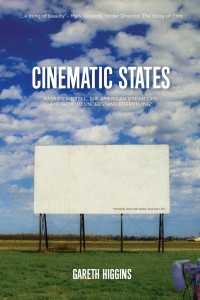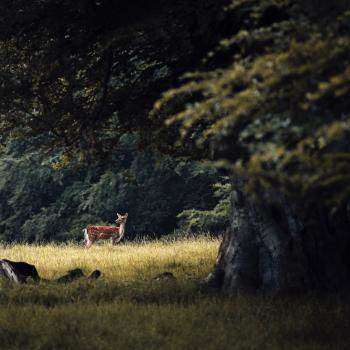“You have to be a stranger to the landscape to regard it as a view.” — Geoff Dyer
“I wish I had your passion, Ray, misdirected as it may be. But it is still a passion.” — Terrence Mann to Ray Kinsella, in Field of Dreams
Author’s note: I’m delighted to be participating in the Glen Workshop this coming June, and would love you to join me to explore the personal (and American) dream narratives in cinema. The journey I took into this subject changed my life, and I hope we can have a similar impact in exploring the same questions together.
My new book Cinematic States takes a look at American myths in one of their most powerful forms. Looking at one movie from each of the fifty states of my adopted homeland I’m asking whether a Kansas yellow brick road really does lead to the end of the rainbow, and does it first have to pass through Colorado’s Overlook Hotel? Amidst the multipurpose woodchippers, friendly exorcists and faulty motel showers, resurrected baseball players and miracle-working gardeners, what do the stories we tell reveal about ourselves, and how can we reimagine who we are?
It was a fascinating experience to research the book, and I discovered immense wells of rich variety in this country that is so easily dismissed by many for its errors, real and perceived.
Bill Withers said that, if you’re going to live the American dream, “It’s alright to head for wonderful. But to get to wonderful you’ll have to pass through alright; and when you get to alright, take a look around.” Because alright might look like home.
In writing the book I spent the better part of a year living in a cinematic dream factory in the hope that I might be able to persuade myself that there actually is somewhere in America that turns out to be just perfect for me and mine. It was a futile hope, because I was asking the wrong question. There may be no place like it, but home isn’t really a physical location. You can have all the houses in the world without ever finding home. You can have all the material goods in the world without ever being rich. You can live in Beverly Hills without ever visiting America.
I know that, to some, the America discussed in Cinematic States or in our discussions at the Glen Workshop will not look like the America in Budweiser ads, or State of the Union speeches, or Uncle Sam finger-pointing posters, or books by Mark Twain.
No, the America of Cinematic States is sometimes—how shall I put this?—a bit of an asshole. But it’s also sometimes a saint.
Its physical landscape can encompass not just the urban blight of Detroit, but the Grand Canyon and the Empire State Building too; its representative people can be painted along a continuum that includes not just Dick Cheney and Kim Kardashian, but also Dorothy Day and Dr. King; its totems are not restricted merely to international belligerence and domestic arrogance, but just as much the desire to share its goodness with others and live free amidst beauty.
It’s a 300 million person paradox. If there’s one thing its recent history tells us, it’s that the American empire is declining. But if there’s one thing that living here has taught me, it’s that if it can accept this with humility, if it can figure out its gift to the world, it can be great again. Because it will have learned to remember things the way they were, rather than how we might have wished them to be. It will have learned to speak not only to the best of its ability, but according to its ability.
Knowing what to do with power is the most important qualification for keeping it—and if there’s one thing that focuses the global hive mind these days, its the fear of what Americans are going to do with their power next.
Clive James once wrote that the “secret of American cultural imperialism—the only version of American imperialism that really is irresistible, because it works by consent —is its concentration of all the world’s artistic and intellectual qualities in their most accessible form. The danger of American cultural imperialism is that it gives Americans a plausible reason for thinking that they can do without the world.”
He’s right, of course; but even within the vehicles such cultural imperialism travels, there is the key to its balance, for as James says, ‘the world helped to make them what they are now—even Hollywood, the nation’s single most pervasive cultural influence, would be unimaginable without its immigrant personnel.”
That’s a comfort to these immigrant eyes. And of course the myth most obviously present in the aforementioned single most pervasive cultural influence should also be a comfort to outsiders. American cinema has taught me something that might make me a whole person. That there’s nothing wrong with having a dream, but if you want your dream to come true, you need to work for it.
And then you need to give it away. It’s the only way to enjoy it. And you’ll never get it if your finger is pointed toward blaming others for why you don’t have it yet. This is true in America as it is true everywhere else.
Which brings us to the end. Or at the end of the beginning. I didn’t know what to expect when I started this journey. It really was a sincere attempt to understand my adopted country, in the hope that I might find a way to stay here. I ended up finding out something about myself.
America’s not the asshole. I’m the asshole. But sometimes I’m a saint. I can have my American dream; but if it’s to be worthy of the name, I need to work for it. And if that work is to work, I need to remind myself of a cinematic truth: that the dream never belonged to me in the first place.
Whatever they may be, America’s gifts to me deserve the kind of attention Walt Whitman once gave to a passing stranger. I am to see to it that I do not lose you.
So, here we are. I’m inviting you to consider joining me to discover more about yourself through exploring the dream logic of American cinema. We’ll talk and watch and laugh and argue and have fun, and we’ll do it for a week in June, in beautiful surroundings with fantastic people, at the Glen Workshop. I hope to see you there.
To learn more about Gareth’s seminar at Glen East, click here.
Gareth Higgins is a Belfast-born writer, film critic, and co-author of several works on peacebuilding, religion, violence and conflict. He is a contributing editor at Sojourners Magazine, has written for publications including The Independent, The Irish Times, and Third Way, and presented on BBC Radio. He also holds a PhD from Queen’s University Belfast and co-hosts the award-winning podcast The Film Talk. Gareth is founding director of the Wild Goose Festival and blogs here. His books include How Movies Helped Save My Soul: Finding Spiritual Fingerprints in Culturally Significant Films (Relevant Books, 2003), co-authorship of Religion, Civil Society, and Peace in Northern Ireland (Oxford University Press, 2012), and the recently published Cinematic States (Burnside Books, 2013). www.garethhiggins.net












